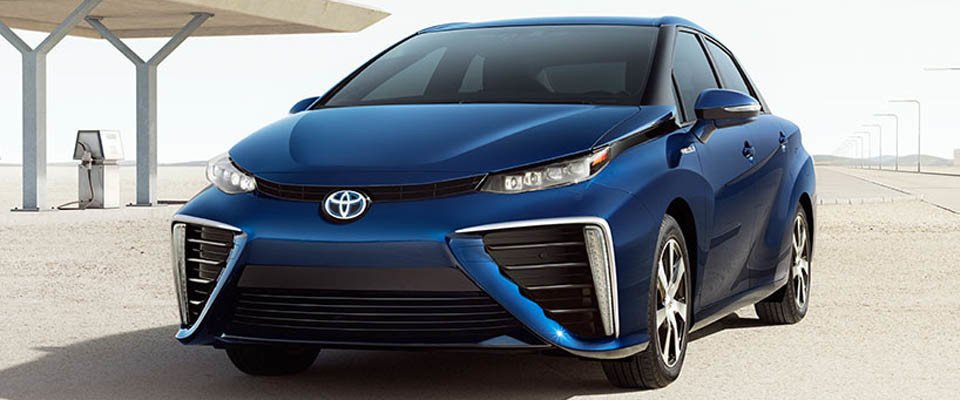-

Overview -

Performance 
Appearance
Comfort
Safety & Warranty-

More Models 2026
Prius
2026
Prius
 2026
Prius Plug-in Hybrid
2026
Prius Plug-in Hybrid
 2026
GR Supra
2026
GR Supra
 2026
GR86
2026
GR86
 2026
Camry
2026
Camry
 2026
Corolla
2026
Corolla
 2026
Corolla Hybrid
2026
Corolla Hybrid
 2026
Mirai
2026
Mirai
 2026
Corolla Hatchback
2026
Corolla Hatchback
 2026
GR Corolla
2026
GR Corolla
 2026
Sienna
2026
Sienna
 2026
bZ
2026
bZ
 2026
bZ Woodland
2026
bZ Woodland
 2026
C-HR
2026
C-HR
 2026
Corolla Cross
2026
Corolla Cross
 2026
Corolla Cross Hybrid
2026
Corolla Cross Hybrid
 2026
Crown
2026
Crown
 2026
Crown Signia
2026
Crown Signia
 2026
RAV4
2026
RAV4
 2026
4Runner
2026
4Runner
 2026
Grand Highlander
2026
Grand Highlander
 2026
Grand Highlander Hybrid
2026
Grand Highlander Hybrid
 2026
Highlander
2026
Highlander
 2026
Highlander Hybrid
2026
Highlander Hybrid
 2026
Land Cruiser
2026
Land Cruiser
 2026
Sequoia
2026
Sequoia
 2026
Tacoma
2026
Tacoma
 2026
Tundra
2026
Tundra
 2025
Prius
2025
Prius
 2025
Prius Plug-in Hybrid
2025
Prius Plug-in Hybrid
 2025
GR Supra
2025
GR Supra
 2025
GR86
2025
GR86
 2025
Camry
2025
Camry
 2025
Corolla
2025
Corolla
 2025
Corolla Hybrid
2025
Corolla Hybrid
 2025
GR Corolla
2025
GR Corolla
 2025
Mirai
2025
Mirai
 2025
Corolla Hatchback
2025
Corolla Hatchback
 2025
bZ4X
2025
bZ4X
 2025
Corolla Cross
2025
Corolla Cross
 2025
Corolla Cross Hybrid
2025
Corolla Cross Hybrid
 2025
Crown
2025
Crown
 2025
Crown Signia
2025
Crown Signia
 2025
RAV4
2025
RAV4
 2025
RAV4 Hybrid
2025
RAV4 Hybrid
 2025
RAV4 Plug-in Hybrid
2025
RAV4 Plug-in Hybrid
 2025
4Runner
2025
4Runner
 2025
Grand Highlander
2025
Grand Highlander
 2025
Grand Highlander Hybrid
2025
Grand Highlander Hybrid
 2025
Highlander
2025
Highlander
 2025
Highlander Hybrid
2025
Highlander Hybrid
 2025
Land Cruiser
2025
Land Cruiser
 2025
Sequoia
2025
Sequoia
 2025
Tacoma
2025
Tacoma
 2025
Tundra
2025
Tundra
 2025
Sienna
2025
Sienna
 2024
Prius
2024
Prius
 2024
Prius Prime
2024
Prius Prime
 2024
GR Supra
2024
GR Supra
 2024
GR86
2024
GR86
 2024
Camry
2024
Camry
 2024
Camry Hybrid
2024
Camry Hybrid
 2024
Corolla
2024
Corolla
 2024
Corolla Hatchback
2024
Corolla Hatchback
 2024
Corolla Hybrid
2024
Corolla Hybrid
 2024
Crown
2024
Crown
 2024
GR Corolla
2024
GR Corolla
 2024
Mirai
2024
Mirai
 2024
Sienna
2024
Sienna
 2024
bZ4X
2024
bZ4X
 2024
Corolla Cross
2024
Corolla Cross
 2024
Corolla Cross Hybrid
2024
Corolla Cross Hybrid
 2024
RAV4
2024
RAV4
 2024
RAV4 Hybrid
2024
RAV4 Hybrid
 2024
RAV4 Prime
2024
RAV4 Prime
 2024
Venza
2024
Venza
 2024
4Runner
2024
4Runner
 2024
Grand Highlander
2024
Grand Highlander
 2024
Grand Highlander Hybrid
2024
Grand Highlander Hybrid
 2024
Highlander
2024
Highlander
 2024
Highlander Hybrid
2024
Highlander Hybrid
 2024
Land Cruiser
2024
Land Cruiser
 2024
Sequoia
2024
Sequoia
 2024
Tacoma
2024
Tacoma
 2024
Tundra
2024
Tundra
 2023
GR Supra
2023
GR Supra
 2023
Prius
2023
Prius
 2023
Prius Prime
2023
Prius Prime
 2023
GR86
2023
GR86
 2023
Camry
2023
Camry
 2023
Camry Hybrid
2023
Camry Hybrid
 2023
Corolla
2023
Corolla
 2023
Corolla Hatchback
2023
Corolla Hatchback
 2023
Corolla Hybrid
2023
Corolla Hybrid
 2023
Crown
2023
Crown
 2023
GR Corolla
2023
GR Corolla
 2023
Mirai
2023
Mirai
 2023
Sienna
2023
Sienna
 2023
bz4X
2023
bz4X
 2023
Corolla Cross
2023
Corolla Cross
 2023
Corolla Cross Hybrid
2023
Corolla Cross Hybrid
 2023
RAV4
2023
RAV4
 2023
RAV4 Hybrid
2023
RAV4 Hybrid
 2023
RAV4 Prime
2023
RAV4 Prime
 2023
Venza
2023
Venza
 2023
Highlander
2023
Highlander
 2023
Highlander Hybrid
2023
Highlander Hybrid
 2023
Sequoia
2023
Sequoia
 2023
4Runner
2023
4Runner
 2023
Tacoma
2023
Tacoma
 2023
Tundra
2023
Tundra
 2022
GR Supra
2022
GR Supra
 2022
Prius
2022
Prius
 2022
Prius Prime
2022
Prius Prime
 2022
Mirai
2022
Mirai
 2022
GR86
2022
GR86
 2022
Avalon
2022
Avalon
 2022
Avalon Hybrid
2022
Avalon Hybrid
 2022
Camry
2022
Camry
 2022
Camry Hybrid
2022
Camry Hybrid
 2022
Corolla
2022
Corolla
 2022
Corolla Hatchback
2022
Corolla Hatchback
 2022
Corolla Hybrid
2022
Corolla Hybrid
 2022
Sienna
2022
Sienna
 2022
C-HR
2022
C-HR
 2022
Corolla Cross
2022
Corolla Cross
 2022
RAV4
2022
RAV4
 2022
RAV4 Hybrid
2022
RAV4 Hybrid
 2022
RAV4 Prime
2022
RAV4 Prime
 2022
Venza
2022
Venza
 2022
Highlander
2022
Highlander
 2022
Highlander Hybrid
2022
Highlander Hybrid
 2022
Sequoia
2022
Sequoia
 2022
4Runner
2022
4Runner
 2022
Tacoma
2022
Tacoma
 2022
Tundra
2022
Tundra
 2021
GR Supra
2021
GR Supra
 2021
Prius
2021
Prius
 2021
Prius Prime
2021
Prius Prime
 2021
Mirai
2021
Mirai
 2021
Corolla
2021
Corolla
 2021
Corolla Hatchback
2021
Corolla Hatchback
 2021
Corolla Hybrid
2021
Corolla Hybrid
 2021
Avalon
2021
Avalon
 2021
Avalon Hybrid
2021
Avalon Hybrid
 2021
Camry
2021
Camry
 2021
Camry Hybrid
2021
Camry Hybrid
 2021
Sienna
2021
Sienna
 2021
C-HR
2021
C-HR
 2021
RAV4
2021
RAV4
 2021
RAV4 Hybrid
2021
RAV4 Hybrid
 2021
RAV4 Prime
2021
RAV4 Prime
 2021
Venza
2021
Venza
 2021
Highlander
2021
Highlander
 2021
Highlander Hybrid
2021
Highlander Hybrid
 2021
Sequoia
2021
Sequoia
 2021
4Runner
2021
4Runner
 2021
Land Cruiser
2021
Land Cruiser
 2021
Tacoma
2021
Tacoma
 2021
Tundra
2021
Tundra
 2020
86
2020
86
 2020
GR Supra
2020
GR Supra
 2020
Prius
2020
Prius
 2020
Prius Prime
2020
Prius Prime
 2020
Yaris
2020
Yaris
 2020
Yaris Hatchback
2020
Yaris Hatchback
 2020
Corolla
2020
Corolla
 2020
Corolla Hatchback
2020
Corolla Hatchback
 2020
Corolla Hybrid
2020
Corolla Hybrid
 2020
Camry
2020
Camry
 2020
Camry Hybrid
2020
Camry Hybrid
 2020
Mirai
2020
Mirai
 2020
Avalon
2020
Avalon
 2020
Avalon Hybrid
2020
Avalon Hybrid
 2020
Sienna
2020
Sienna
 2020
C-HR
2020
C-HR
 2020
RAV4
2020
RAV4
 2020
RAV4 Hybrid
2020
RAV4 Hybrid
 2020
Highlander
2020
Highlander
 2020
Highlander Hybrid
2020
Highlander Hybrid
 2020
Sequoia
2020
Sequoia
 2020
4Runner
2020
4Runner
 2020
Land Cruiser
2020
Land Cruiser
 2020
Tacoma
2020
Tacoma
 2020
Tundra
2020
Tundra
 2019
86
2019
86
 2019
Prius
2019
Prius
 2019
Prius C
2019
Prius C
 2019
Prius Prime
2019
Prius Prime
 2019
Yaris
2019
Yaris
 2019
Corolla
2019
Corolla
 2019
Corolla Hatchback
2019
Corolla Hatchback
 2019
Camry
2019
Camry
 2019
Camry Hybrid
2019
Camry Hybrid
 2019
Mirai
2019
Mirai
 2019
Avalon
2019
Avalon
 2019
Avalon Hybrid
2019
Avalon Hybrid
 2019
Sienna
2019
Sienna
 2019
C-HR
2019
C-HR
 2019
RAV4
2019
RAV4
 2019
RAV4 Hybrid
2019
RAV4 Hybrid
 2019
Highlander
2019
Highlander
 2019
Highlander Hybrid
2019
Highlander Hybrid
 2019
Sequoia
2019
Sequoia
 2019
4Runner
2019
4Runner
 2019
Land Cruiser
2019
Land Cruiser
 2019
Tacoma
2019
Tacoma
 2019
Tundra
2019
Tundra
 2018
86
2018
86
 2018
Prius
2018
Prius
 2018
Prius C
2018
Prius C
 2018
Prius Prime
2018
Prius Prime
 2018
Yaris
2018
Yaris
 2018
Yaris iA
2018
Yaris iA
 2018
Corolla
2018
Corolla
 2018
Corolla iM
2018
Corolla iM
 2018
Camry
2018
Camry
 2018
Camry Hybrid
2018
Camry Hybrid
 2018
Mirai
2018
Mirai
 2018
Avalon
2018
Avalon
 2018
Avalon Hybrid
2018
Avalon Hybrid
 2018
Sienna
2018
Sienna
 2018
C-HR
2018
C-HR
 2018
RAV4
2018
RAV4
 2018
RAV4 Hybrid
2018
RAV4 Hybrid
 2018
Highlander
2018
Highlander
 2018
Highlander Hybrid
2018
Highlander Hybrid
 2018
Sequoia
2018
Sequoia
 2018
4Runner
2018
4Runner
 2018
Land Cruiser
2018
Land Cruiser
 2018
Tacoma
2018
Tacoma
 2018
Tundra
2018
Tundra
 2017
86
2017
86
 2017
Prius
2017
Prius
 2017
Prius Prime
2017
Prius Prime
 2017
Prius V
2017
Prius V
 2017
Yaris
2017
Yaris
 2017
Yaris iA
2017
Yaris iA
 2017
Corolla
2017
Corolla
 2017
Corolla iM
2017
Corolla iM
 2017
Camry
2017
Camry
 2017
Camry Hybrid
2017
Camry Hybrid
 2017
Mirai
2017
Mirai
 2017
Avalon
2017
Avalon
 2017
Avalon Hybrid
2017
Avalon Hybrid
 2017
Sienna
2017
Sienna
 2017
RAV4
2017
RAV4
 2017
RAV4 Hybrid
2017
RAV4 Hybrid
 2017
Highlander
2017
Highlander
 2017
Highlander Hybrid
2017
Highlander Hybrid
 2017
Sequoia
2017
Sequoia
 2017
4Runner
2017
4Runner
 2017
Land Cruiser
2017
Land Cruiser
 2017
Tacoma
2017
Tacoma
 2017
Tundra
2017
Tundra
 2016
Prius
2016
Prius
 2016
Prius C
2016
Prius C
 2016
Prius V
2016
Prius V
 2016
Yaris
2016
Yaris
 2016
Corolla
2016
Corolla
 2016
Camry
2016
Camry
 2016
Camry Hybrid
2016
Camry Hybrid
 2016
Mirai
2016
Mirai
 2016
Avalon
2016
Avalon
 2016
Avalon Hybrid
2016
Avalon Hybrid
 2016
Sienna
2016
Sienna
 2016
Rav4
2016
Rav4
 2016
Rav4 Hybrid
2016
Rav4 Hybrid
 2016
Highlander
2016
Highlander
 2016
Highlander Hybrid
2016
Highlander Hybrid
 2016
Sequoia
2016
Sequoia
 2016
4Runner
2016
4Runner
 2016
Land Cruiser
2016
Land Cruiser
 2016
Tacoma
2016
Tacoma
 2016
Tundra
2016
Tundra
 2015
Prius
2015
Prius
 2015
Prius c
2015
Prius c
 2015
Prius Plug-in Hybrid
2015
Prius Plug-in Hybrid
 2015
Prius V
2015
Prius V
 2015
Yaris
2015
Yaris
 2015
Corolla
2015
Corolla
 2015
Camry
2015
Camry
 2015
Camry Hybrid
2015
Camry Hybrid
 2015
Avalon
2015
Avalon
 2015
Avalon Hybrid
2015
Avalon Hybrid
 2015
Sienna
2015
Sienna
 2015
Rav4
2015
Rav4
 2015
Rav4 EV
2015
Rav4 EV
 2015
Venza
2015
Venza
 2015
FJ Cruiser
2015
FJ Cruiser
 2015
Highlander
2015
Highlander
 2015
Highlander Hybrid
2015
Highlander Hybrid
 2015
Sequoia
2015
Sequoia
 2015
4Runner
2015
4Runner
 2015
Land Cruiser
2015
Land Cruiser
 2015
Tacoma
2015
Tacoma
 2015
Tundra
2015
Tundra
2017 Toyota Mirai OVERVIEW 
2017 Toyota Mirai in Romeoville
“The future. Available now.” —Toyota.com
- 3 Years' worth of complimentary fuel
- 312 EPA-rated miles per tank
- 5 Minutes to refuel (approximately)
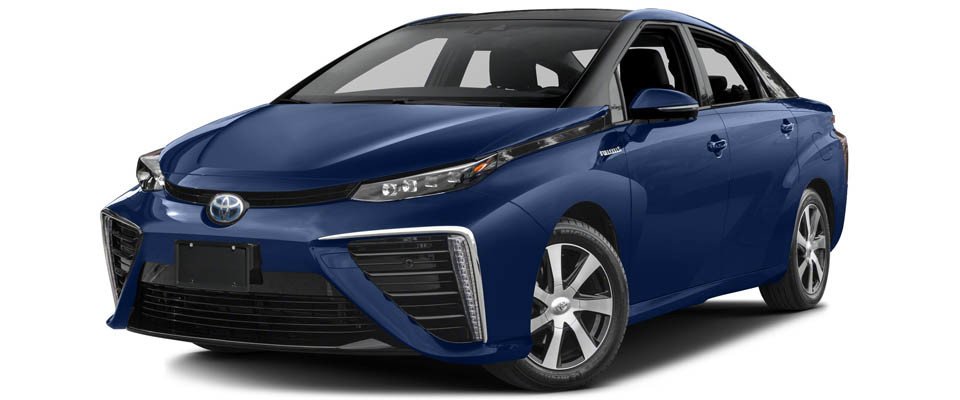
Toyota Mirai Dealer in Romeoville
Toyota PERFORMANCE 
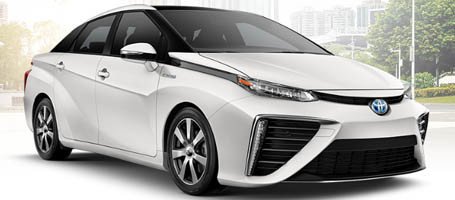
Air
The FCV's front intake grills deliver the outside air to the fuel cell stack.
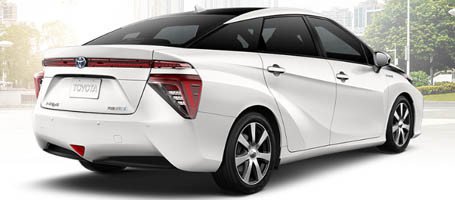
Hydrogen
When you pump hydrogen into the vehicle, the gas travels to a carbon-fiber reinforced fuel tanks where it's stored.
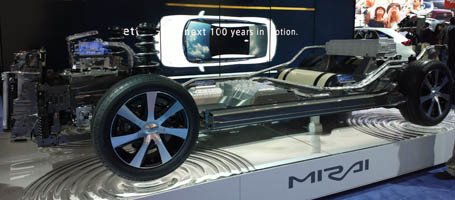
Electricity
Hydrogen travels from the tanks to the fuel cell stack. There, it goes through a chemical reaction involving the oxygen in the air, creating electricity to power the vehicle.
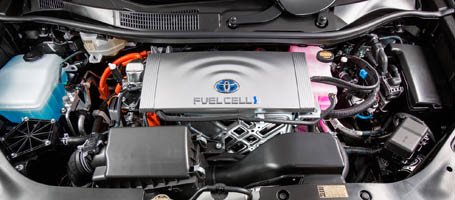
Forward
When you put your foot on the gas pedal, electricity from the fuel cell stack is sent to the motor.
2017 Mirai APPEARANCE 
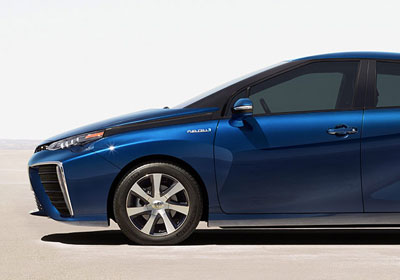
Mirrors
Heated outside mirrors with power-folding feature
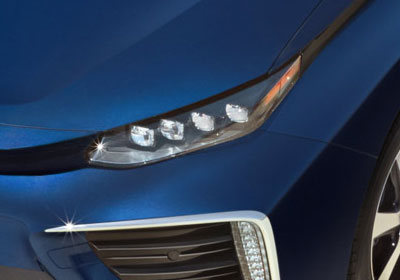
LED Headlamps
LED headlamps with auto high-beam feature
Toyota Mirai COMFORT 
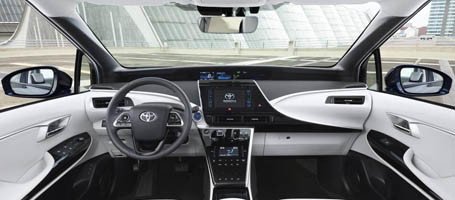
Acoustic Noise-Reducing Glass
Acoustic noise-reducing glass for the windshield, driver-side and front-passenger-side windows.
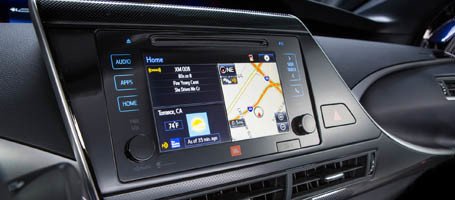
Audio System
Premium audio system with Navigation, JBL and Entune App Suite.
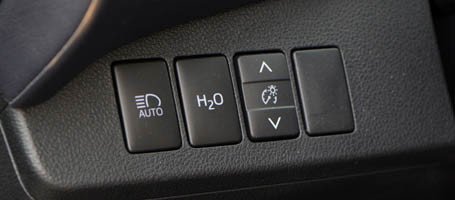
Controls
Intelligent touch controls for climate and audio.
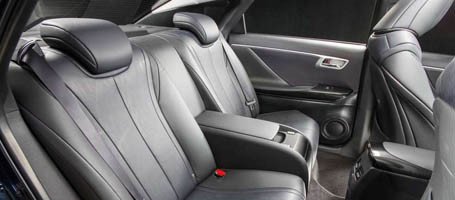
Eight SRS Airbags
The cabin is equipped with a driver and front passenger Advanced Airbag System, front seat-mounted side airbags for the driver and front passenger, front and rear side curtain airbags, plus driver knee and front passenger seat-cushion airbags. They're all part of a system designed to help keep you safe.
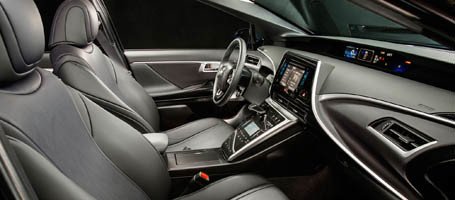
SofTex® seats
8-way power-heated SofTex® seats with power lumbar
2017 Toyota Mirai SAFETY & WARRANTY 
Basic Warranty 3 years/36,000 miles • Powertrain Warranty 5 years/60,000 miles • Rust-Through Warranty 5 years/unlimited miles • Hybrid System Warranty 8 years/100,000 miles
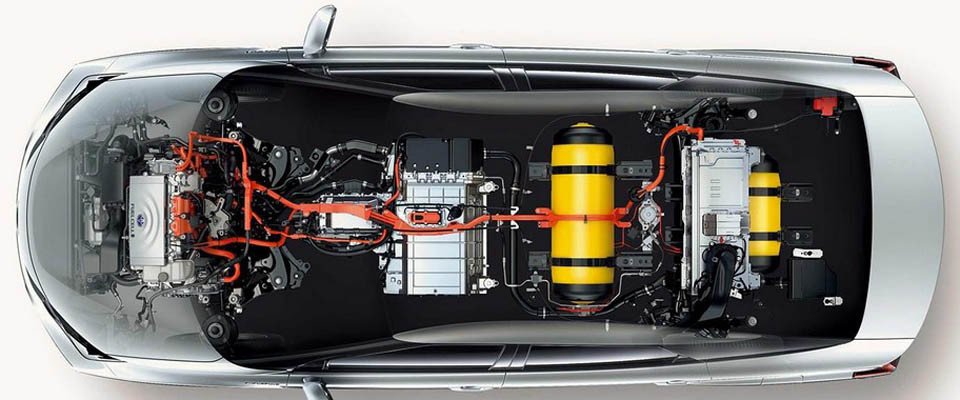

Tanks Designed Not To Leak
Our multi-patented, carbon-fiber-wrapped, polymer-lined tanks are built in a three-layer structure and absorb five times the crash energy of steel.
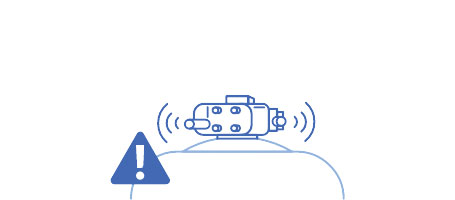
In a High-Speed Collision, Sensors Stop The Flow Of Hydrogen
To prevent hydrogen from traveling to potentially damaged systems outside of the tank, the system automatically shuts the tank's hydrogen output valve.
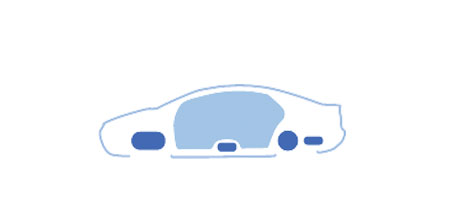
Any Leaked Hydrogen is Quickly Dispersed
All hydrogen-related parts are located outside the cabin and designed to help ensure leaked hydrogen doesn't build up.

Hydrogen Escapes Safely Into The Atmosphere
Since the gas is lighter than air, it rapidly disperses, reducing the time window to cause damage in the event of an ignition.
We're sorry, but we do not have a 2017 Toyota Mirai in our current inventory.
Disclaimers
- * For up-to-date pricing and disclaimer information please contact your local dealer.
